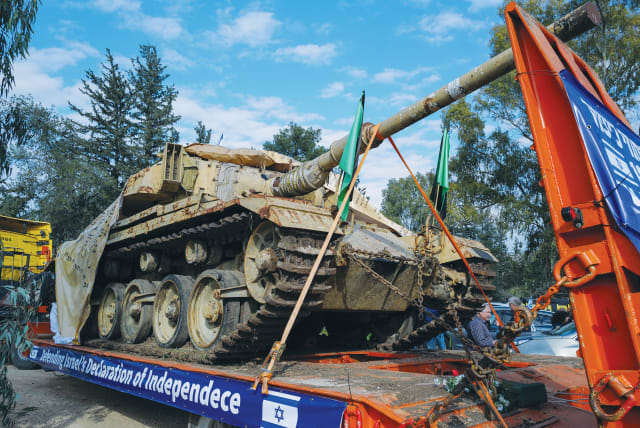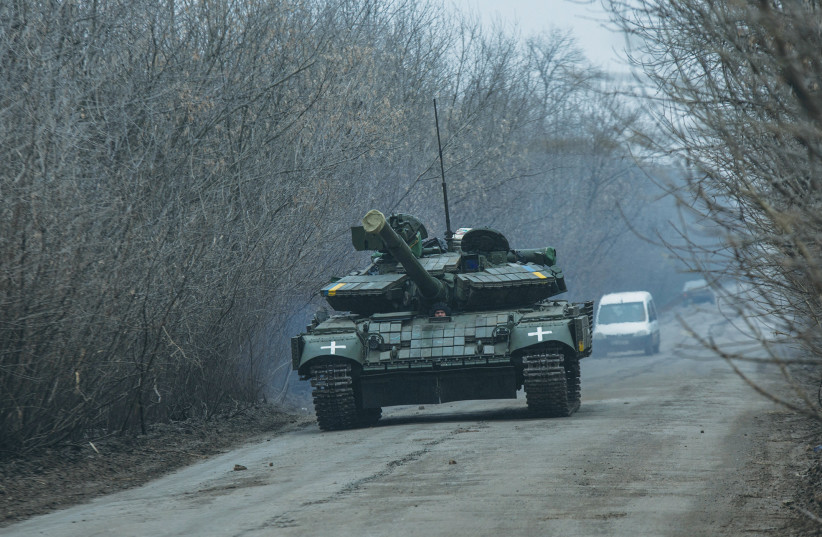My Word: Mobilizing tanks in a battle of wills

Justice Minister Yariv Levin, who is forging ahead with the judicial overhaul despite demonstrations, entreaties and threats, has been accused of many things.
Something about the current conflict in Israel over the government’s proposed judicial reform is causing columnists to summon up Winston Churchill quotes à la “We shall fight on the beaches...”
Many Hebrew-speakers have similarly turned to Shimon Peres for inspiration in their hour of need. He, too, had a way with words. But I remembered Peres in a different context last week. Some time in the mid-1990s, the Oslo Accord days, I attended a routine Labor faction meeting in the Knesset where MKs, including then-party leader Peres, kept referring to the way Labor won the Six Day War and reunited Jerusalem.
After the meeting, I went up to Peres. When I politely pointed out that the victory in 1967 was won by the IDF, not a political party, his famous charm and smile instantly disappeared and were replaced by a cold stare. It was another reminder that for many Labor Party members of a certain age and standing, the country and the party were one and the same. They have never forgiven Likud leader Menachem Begin for winning the 1977 election and will never forgive Benjamin Netanyahu for winning several subsequent elections – particularly when he beat Peres in 1996, and for his latest win last November.
This is not, as Churchill might have put it, our finest hour. The recollection of my chilly encounter with Peres resurfaced when I heard about the incident when anti-reform protesters borrowed – or stole – a tank from the Yom Kippur War memorial at Tel Saki on the Golan Heights and mobilized it for their cause, the battle of narratives.
Justifying the removal of the tank from a memorial to soldiers – of all political persuasions – who died in a bitter battle in 1973, the protest organizers claimed it as their own. The scenes in which Ashkenazi and Sephardi tank crew members were pitted against each other while fighting a common enemy in the recent hit series Valley of Tears were clearly exaggerated for dramatic purposes but they were based on a real struggle.
The old Centurion tank last week had the word “Democracy” inelegantly spray-painted on its side and was covered with a tarpaulin decorated with the Declaration of Independence. The transporter on which it was loaded had banners declaring in misspelled English: “Defending Israel’s Declaration of Independene.” I felt like scribbling a “sic” next to it. It was a sick (sic) stunt.
It was not immediately clear what the former armored corps commanders and fighters meant by the gimmick: Were they hinting that they would bring tanks to the streets if the reform went ahead? Threats of civil war have been heard at demonstrations and other forums in the last few weeks. If a tank appears in the first act, don’t expect a happy ending to the drama.
When protesters chant about “Crime Minister” Benjamin Netanyahu heading a government while fighting corruption charges, I don’t think only of former premier Ehud Olmert who resigned ahead of his trial for corruption (in which he was found guilty). Being a former political reporter, I don’t need tanks for the memories. I recall Ariel Sharon who was coddled from media criticism during his investigation for bribery after he had announced his disengagement plan from the Gaza Strip. It was called the Etrog Phenomenon, but it only applies to leaders on a certain side of the political map.
Trials on various charges
Unfortunately, a lot of Israeli political figures have faced trials on various charges – some were later proven, others not. Almost every recent prime minister has had a shadow cast on him – which is why I favor a version of the so-called French Law under which a serving premier would not be prosecuted while in office, but the number of consecutive terms they can serve would be limited.
Justice Minister Yariv Levin, who is forging ahead with the judicial overhaul despite demonstrations, entreaties and threats, has been accused of many things. Cowardice should not be among them. A string of potential justice ministers in the past, whose candidacy did not have the support of the Supreme Court and officials in the State Attorney’s office – including Yaakov Ne’eman, Reuven Rivlin and Haim Ramon – were subjected to criminal investigations that prevented their appointments.
Levin and Knesset Constitution, Law and Justice Committee head Simcha Rothman – along with Netanyahu – repeatedly said in the last two weeks that they would be willing to negotiate the final form of the legislation, as President Isaac Herzog urged, but they have been rebuffed by the opposition.
The absence of trust on both sides is obvious – but they need to conquer it if the country is going to be able to overcome this current, very real crisis. Some points in the reform are positive – including changes to the Judicial Selection Committee. Levin and Rothman’s reform would bring more women to the committee and hopefully also broaden the representation of different sectors in the courts.
There needs to be a balance between the “judicial activism” that was the legacy of former Supreme Court President Aharon Barak in the 1990s and the rights of the democratically elected Knesset. The High Court of Justice should not have a free hand to overturn Knesset laws, but neither should the Knesset be allowed to easily override High Court decisions, as the reform would have it. Figuring out the exact numbers of what majority is required both on the bench and in the legislature should not be impossible – as long as both sides are willing to meet for serious discussions. Legislation is more than a recommendation, as perceived by the courts, and legislation should not be used solely as a declaration by politicians.
WHILE THE initial stage of the reform was presented for first reading on Monday – it passed by a vote of 63-47 – large numbers of demonstrators continued their rallies. Most of the protests were legitimate and good natured. But not all. Small groups of protesters gathered outside the homes of some coalition MKs to try to delay them getting to the Knesset. The case of Likud MK Tally Gotliv rightly received the most publicity. Demonstrators who tried to keep her under house arrest – in the name of democracy – also prevented her from taking her autistic daughter to her special education school.
This was too much even for Opposition leader Yair Lapid, who also has an autistic daughter. He condemned this particular protest, but showed no sign of reducing the level of rhetoric elsewhere, or dropping his self-fulfilling prophesies of diplomatic and economic woes.
As more and more main roads were blocked – thankfully by foot soldiers of the opposition rather than armored vehicles – I wondered where it would end. Who in the future would have the last word in deciding whether closing a main traffic artery was acceptable? If it’s OK for anti-government protesters, is it now alright for haredim, minority groups, workers looking for a wage rise and others? When freedom of expression and freedom of movement clash, who has the last word?
The tank gimmick wasn’t the only eye-catching protest. In Tel Aviv, some 20 women wore the red capes and white bonnets of Margaret Atwood’s dystopian The Handmaid’s Tale. Yet in the book, the women are forced to bear children for the barren ruling class. Strangely, the distinctive clothing and concern for the rights of women were not seen and heard during the mass demonstrations in 2018 when thousands of people went on strike and blocked roads – while shouting anti-Netanyahu slogans – calling for Israel’s Surrogacy Law to be extended to include same-sex couples. The law, which already included single women without a functioning womb, was broadened in 2022 with the assistance of the High Court to apply also to single men and transsexual individuals.
It’s a welcome development for those desperate to be parents in a child-obsessed country, but the (non-existent) jury is out on whether it is a positive step from the viewpoint of women’s rights. The world is complicated and it’s not getting any easier.
I have always been a “pick your battles” person. Now I realize that picking your weapons is equally important. There’s room to work out which points of the reform are worth fighting for and which can be changed or dropped. There’s no need for tanks and no place for civil war.
Jerusalem Post Store
`; document.getElementById("linkPremium").innerHTML = cont; var divWithLink = document.getElementById("premium-link"); if (divWithLink !== null && divWithLink !== 'undefined') { divWithLink.style.border = "solid 1px #cb0f3e"; divWithLink.style.textAlign = "center"; divWithLink.style.marginBottom = "15px"; divWithLink.style.marginTop = "15px"; divWithLink.style.width = "100%"; divWithLink.style.backgroundColor = "#122952"; divWithLink.style.color = "#ffffff"; divWithLink.style.lineHeight = "1.5"; } } (function (v, i) { });

